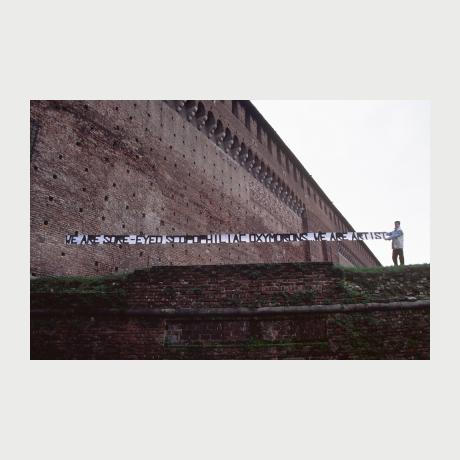GALLERY ON THE MOVE
The nomadic series "Writing Jobs" took off in 2001 and has since traversed quite a number of stations. There have been sightings of it amongst the “Agency of Unrealised Projects” by E-Flux, at Art Thessaloniki, or at the 13th Cairo Biennial, next to many other, less noticeable places. “Writing is Work! Everyday Work! Salaried Work!” goes the announcement for its most recent presentation at Zeta Gallery in Tirana, that opened its doors on June 4th, 2019. It's 40°
Celsius at the time of writing, some 2.000 kilometer further North, and writing is a hard job.
There is a claim in the artist's catalogue that "Writing Jobs" is seeking its closure this year, but there are reasons to dissent this as well. Writing is everyday work. It is endless work. How could, why would it ever end? And where would the art – and the money – come from? We are, once again, in the middle of a conundrum that in so may ways seems to forge Zguro's body of work as a whole. Different projects merge into different formats, take up different titles and (self)organize their respective endurances. As so intrinsic to Zguro's work, "Writing Jobs" specific nomadism is not only a question of being applied in different surroundings, countries, or continents, or as well, of temporarily squatting, with a twinkle of one's eye, allied works such as "Here" or "Mr Dosti". It is also nomadic in terms of endlessly inverting the readings and assumptions that are made about it. “Writing is work! Salaried Work!” doesn't carry a promise. It rather comes as a sort of daisy-picking between true and untrue allegations. As anyone who has been “working jobs” in the literal sense of the word, knows that “Salaried Work!” is most likely an indication for the most precarious salary, or no monetary salary at all. Beware the exclamation mark! It calls on you when you are chanceless, and if the story continues that way, it may become a dubious kind of companion. In this world full of interpellations, as Althusser once called this curious moment of “being addressed”, Zguro inserts "Writing Jobs" into the public sphere, on walls, banners, or even plastic bags, like a missing thread to such contradictory existence.
The writings draw on literary sources, use the local language, and in regard to their dimensions suggest a lot of work to put them up in the first place. They come and go, limited in time as if paid by hour, using a pattern similar to a
commercial campaign. There are many things to reason about if it comes to their specific impact as installations, but they also suggest an extraordinary performance: an unexpected reality touch-down. In art, it's made clear again, there is no work, except one invents it. This also means that the work of an artist is always more work than art. And that's in fact something vitally reassuring.
SONJA LAU





